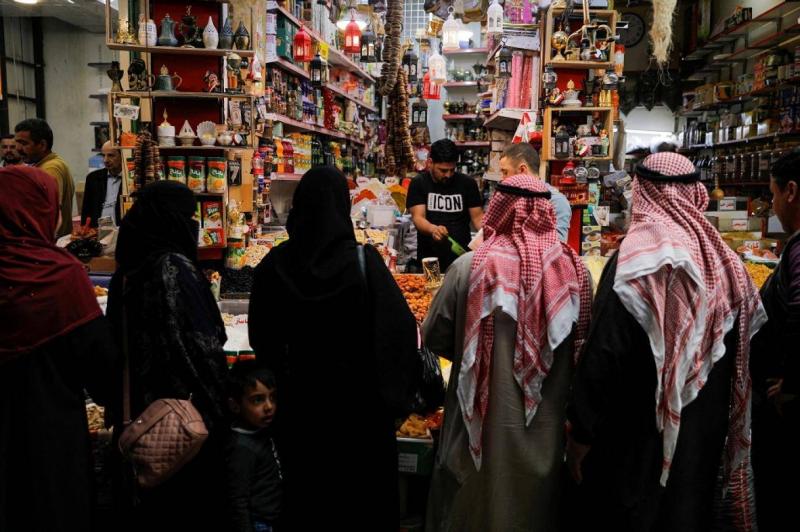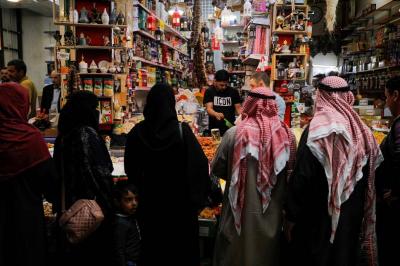Iraq's foreign currency reserves are the largest in the country's financial history, exceeding $100 billion. At the same time, they constitute Iraq's central reserve portfolio, and most of the market demand for financing external transactions in the private sector is met through those official reserves, which the monetary authority offers via its platform at an official exchange rate of 1,320 dinars per dollar. This was stated by the Prime Minister's financial advisor, Muthar Mohammed Saleh, who noted a demand for cash dollars to fund trade operations for very specific goods, typically no more than five items.
Saleh explained that "forces within the market are trying to trade using unofficial commercial channels by seeking cash dollars from the parallel market (which only accounts for 10% of the market's foreign currency needs) to fund their trades." He emphasized that these "commercial actions are not legally recognized by financial, commercial, and banking authorities and occur for various reasons, including tax evasion, customs evasion, or quality control issues." The financial advisor continued by stating that "the essential issue in controlling the parallel market lies in combating illegal trade activities above all."
**Policy Package**
Saleh indicated that "the government is currently undertaking a policy of defending economic stability, especially in consistently providing adequate commodity supplies at reasonable prices, in two directions." The first is, according to Saleh, "to provide additional supportive food and pharmaceutical baskets, construction materials, and highly demanded spare parts, purchasing them at the stable official exchange rate through cooperation between the government and the private sector."
The second direction involves "the monetary authority adopting new mechanisms to provide liquid foreign currencies in addition to the dollar (from a basket of diverse foreign currencies) to meet travel needs based on the traveler's destination, especially for Hajj, Umrah, and various tourism purposes, to different neighboring and distant countries." He stated that "the aforementioned policy package aims to contain the noise generated by foreign currency speculators in the parallel market, seeking to profit at the expense of economic stability, and that the fundamental orientations in economic policy should isolate the influences of the parallel or black market and the limited activities of their illegal operations from the overall price stability system in the country."
**Organized Smuggling for Two Reasons**
For his part, economic expert Nabil Al-Marsoumi considered that "what is happening is not a process of speculation on the black dollar in the parallel market and cash dollars aimed at profit-taking from price fluctuations, but rather an organized smuggling of travel dollars or cash dollars for two primary reasons."
Al-Marsoumi mentioned to Shafaq News Agency that "the first reason is to settle for some imported goods from abroad that do not enter the electronic platform (gold, drugs, alcoholic beverages, cigarettes)." He noted that "some of these goods are of very high value, as Iraq imports about $1 billion in cigarettes annually, while the value of alcoholic beverages is no less than $250 million annually." Regarding the second reason for dollar smuggling, the economic expert attributed it to "the high demand for dollars in the parallel market due to the need for dollars to settle trade exchanges, or Iraq's imports from Iranian goods, which reach $10 billion annually."
He added that "this is because Iran and Syria are also countries sanctioned by the United States, so commercial transactions with them cannot be settled through bank transfers, leading to reliance on the parallel market, and high demand for scarce dollars results in price increases." Al-Marsoumi believed that "the central bank will not be able, no matter what it does, to reduce the gap between the official and parallel prices as long as trade with U.S.-sanctioned countries continues, along with a large segment of travelers to sanctioned countries, especially Iran."
He stated that "when travelers cannot obtain dollars at the official price, they turn to dollars from the parallel market, which increases its price," revealing that "Iraqi travelers request about $3.5 billion annually from the parallel market." Al-Marsoumi concluded that "all these reasons have led and will lead to an widening gap between the parallel and official prices in the Iraqi market."
**"Fictitious Stagnation"**
The rise of the dollar causes "stagnation in market movement, halting traders from paying, buying, and selling, despite the existence of a cash flow, which is referred to as (fictitious stagnation) due to the instability of the exchange rate," said the Vice President of the Baghdad Chamber of Commerce, Hassan Sheikh. However, real economic stagnation, according to Sheikh, is "based on the lack of cash liquidity among citizens, alongside a significant oversupply of goods, in the absence of any purchasing power, even though Iraq has strong financial capabilities, but the exchange rate determines market movement."
He noted that "the government's printing of cash also affects the exchange rate; as a large cash amount is pumped into the market without the presence of dollars, demand for dollars will increase as they are seen as a safe haven for citizens' savings, and even for transactions." Sheikh clarified that "the trader is not a speculator, as some accuse, but rather sells in dollars to preserve his capabilities."
He confirmed that several strategies have been proposed as advice to resolve this crisis, but the government has not adopted them, urging efforts to "create an attractive investment environment through the stabilization of the exchange rate, so that traders and contractors feel their money is secure and can invest within the country."




